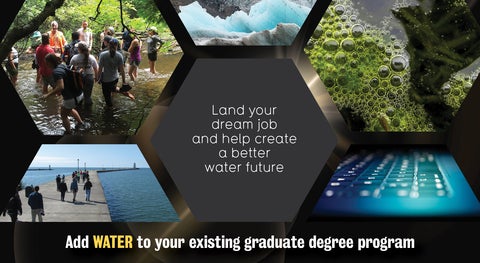Collaborative Water Program

Co-delivered by 11 departments and schools from across all 6 faculties, the Collaborative Water Program is the most interdisciplinary water graduate program in Canada, training the next generation of leaders.
Future workforce knowledge and skills

The Collaborative Water Program is training the next generation of water leaders by focusing on the thinking, knowledge and skills required to navigate complex water challenges in a fast-changing water world. Collaborative Water Program students with diverse disciplinary backgrounds develop the cognitive, self-efficacy, management, technological and collaborative skills sought after by employers.
WATER 601
WATER 601 is a 12-week course generally offered in the Winter term. The course provides an overview of current issues and challenges in water research and management from a variety disciplinary perspectives, including water science, engineering, governance and economics. Its purpose is to provide students with a broad knowledge base of the key theories, concepts and terminology from various water-related fields, and to allow them to develop connections with peers, water researchers and professionals in other areas of study. Seminars and discussions with Water Institute faculty members and professionals from different disciplines will introduce students to current research and practice
Water 602
WATER 602 is a project-based course designed to extend the interdisciplinary learning in WATER 601 from the classroom to the world of practice. WATER 602 is generally offered in the Fall term and is comprised of an intensive field-based learning component and a classroom-based and self-directed project component. Field-based learning focuses on the Grand River watershed through the perspective of various stakeholders, including conservation authorities, municipalities, practitioners, industry and citizens groups. Projects challenge interdisciplinary groups of students to work collaboratively and with stakeholders to address specific opportunities or challenges.
Research seminar milestone
In addition to WATER 601 and WATER 602, Collaborative Water Program students must complete a Research Seminar milestone to discuss how learnings from WATER courses were applied in, or influenced, research work in the student’s home department or school. This milestone is normally met in March, following completion of WATER 602, during the Water Institute’s World Water Day program.

"I decided to come to Waterloo because of the Collaborative Water Program. While specializing in biology and math, I was interested in connecting the different disciplines together. When I came across the CWP on a potential supervisor's website I said, 'Oh my gosh, this is the program I was looking for; this is going to be the university where I do my master's.'"
Sabrina Bedjera
Policy Analyst, Natural Resources Canada, CWP Cohort 3 (2015/16)

"I got a glimpse of some of the other water-related sciences like geomorphology and marine biology during my undergrad studies. Joining the Collaborative Water Program allowed me to learn more about a wide range of disciplines through collaboration with multiple water professors and students. It was just a great opportunity and has been a real enabler for my professional career."
Chris Muirhead
Water Resources Engineer, GHD, CWP Cohort 4 (2016/17)

"When I was looking for universities and supervisors to do my PhD work, the Collaborative Water Program was definitely a differentiator. Many universities have professors working in water, but not many have a cross-cutting program where you can learn from a wide-array of specialists and integrators, not just your supervisor and your department."
Fabiola Alvarado-Revilla
Postdoctoral Researcher, University of Oxford, CWP Cohort 3 (2015/16)

“The Collaborative Water Program is a truly unique program that taught us how to appreciate and deepen our connection to water. I still carry the teachings and the beautiful learnings and knowledge from the program with me to this day. My graduate experiences in the Collaborative Water Program really helped to shape the way I think, I work and play in my day-to-day activities.”
Maricor Arlos
Assistant Professor in the Department of Civil and Environmental Engineering at the University of Alberta, CWP Cohort 1 (2013/14).
How to Apply
The Collaborative Water Program is open to Master’s and PhD students studying water in thesis or major-paper based programs from the following departments and schools:
- Applied Mathematics
- Architecture
- Biology
- Chemical Engineering
- Civil and Environmental Engineering
- Earth and Environmental Sciences
- Economics
- Environment, Enterprise and Development
- Environment, Resources and Sustainability
- Geography and Environmental Management
- Planning (PhD only)
- Public Health Sciences
For specific admission and application requirements, consult the University of Waterloo's Graduate Studies Academic Calendar listing of degree programs with Collaborative Water Program options.
For more information, please contact respective department/school Graduate Studies Co-ordinators or Julie Grant at the Water Institute.

